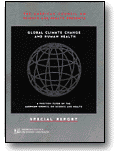A Position Paper of The American Council on Science and Health
According to some forecasters, adverse impacts on the health of the human population may result from anthropogenic (human-induced) climate change specifically, rises in the average temperature of the Earth's surface due to human actions that increase atmospheric concentrations of carbon dioxide and other greenhouse (heat-trapping) gases.
Computer simulations of the Earth's climate project that, if atmospheric concentrations of greenhouse gases increase as predicted, the average global temperature will increase by 1 to 3.5 degrees Celsius (C) by the year 2100. Simulations based on this estimate project changes in environmental conditions that may be detrimental to human health, including increases in:
exposure to infectious diseases,
the incidence of extreme weather events (e.g., heat waves), and
coastal flooding due to sea level rise.
In this report the American Council on Science and Health (ACSH) reviews recent assertions concerning the potential adverse health effects of projected human-induced global climate change. Sourcebooks included Climate Change and Human Health, The Global Burden of Disease Study (1996), the World Health Report 1996, and the World Health Report 1997. It was not ACSH's intention to evaluate the hypothesis that such climate change will occur. Our guiding questions were:
How might global climate change affect the health of the human population?
How should policymakers respond to the prospect of climate-change-related health effects?
Current proposals for dealing with projected climate change focus on mitigating (lessening) predicted human-induced global warming through severe compulsory limiting of developed countries' greenhouse-gas emissions. Implementation of these proposals would significantly weaken the global economic system. The optimal approach to dealing with the prospect of adverse climate-change-related health effects would be largely adaptational: its primary goal would be to suit economies, healthcare systems, and living conditions to lasting i.e., existing and foreseeable challenges to human health. Such a strategy would focus on preventing adverse health effects of ongoing natural climate change without impeding the global economic system. Regardless of whether human-induced climate change will occur, we need policies for coping with infectious diseases and severe weather impacts of natural origin. Implementation of policies for dealing with present-day climatic impacts adverse to human health would facilitate coping in the future with any adverse health impacts of human-induced climate change.
According to most computer simulations, global climate change would develop slowly. Timely, vigorous, well-financed medical-research and public health efforts against major real-life health problems should provide tools that would be effective against most of the potential adverse 21st century health effects of projected climate change.
